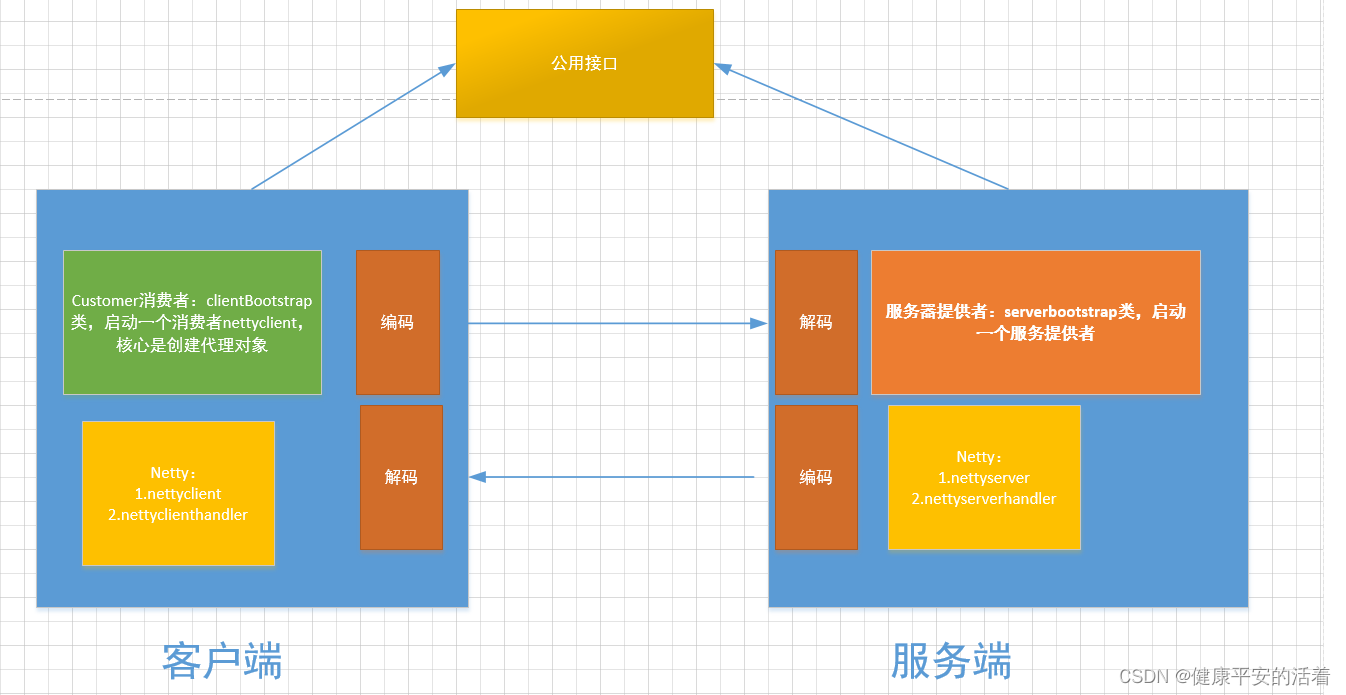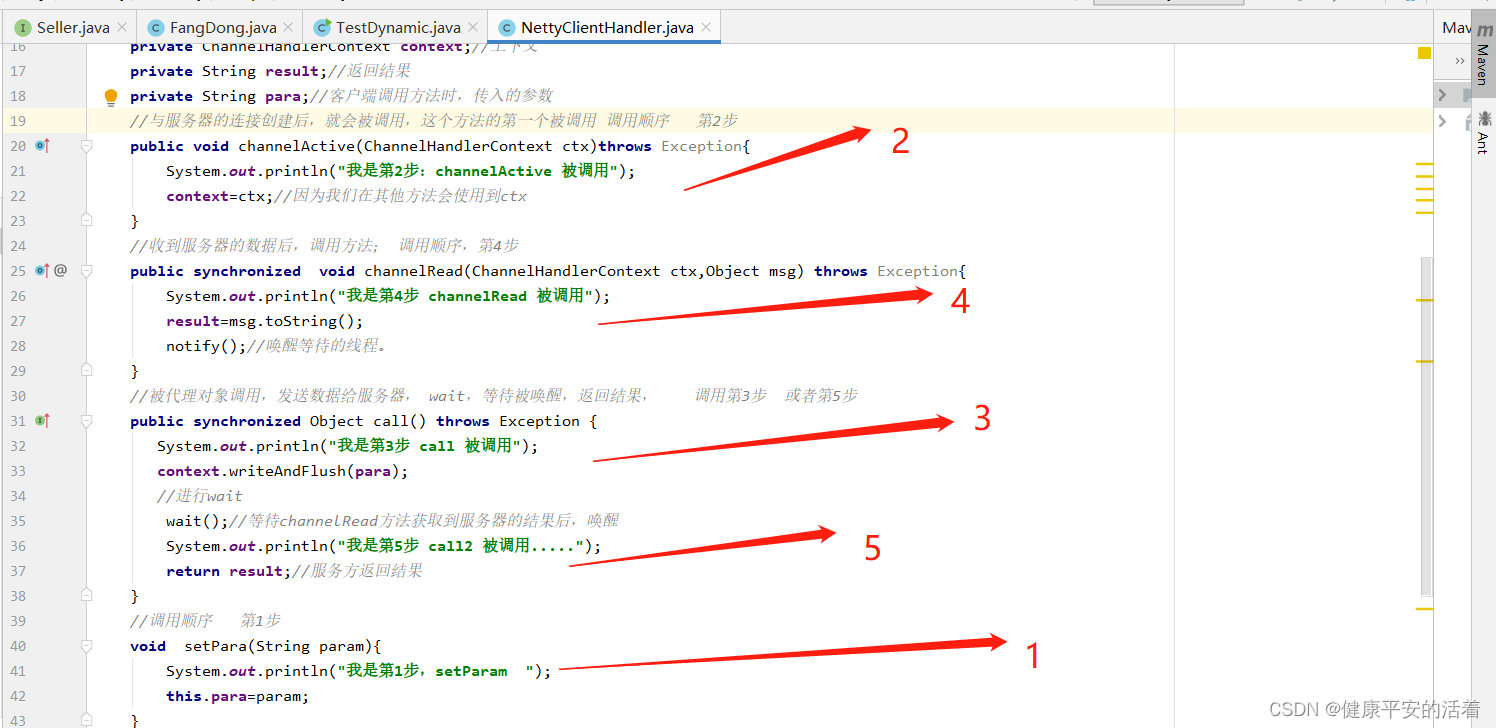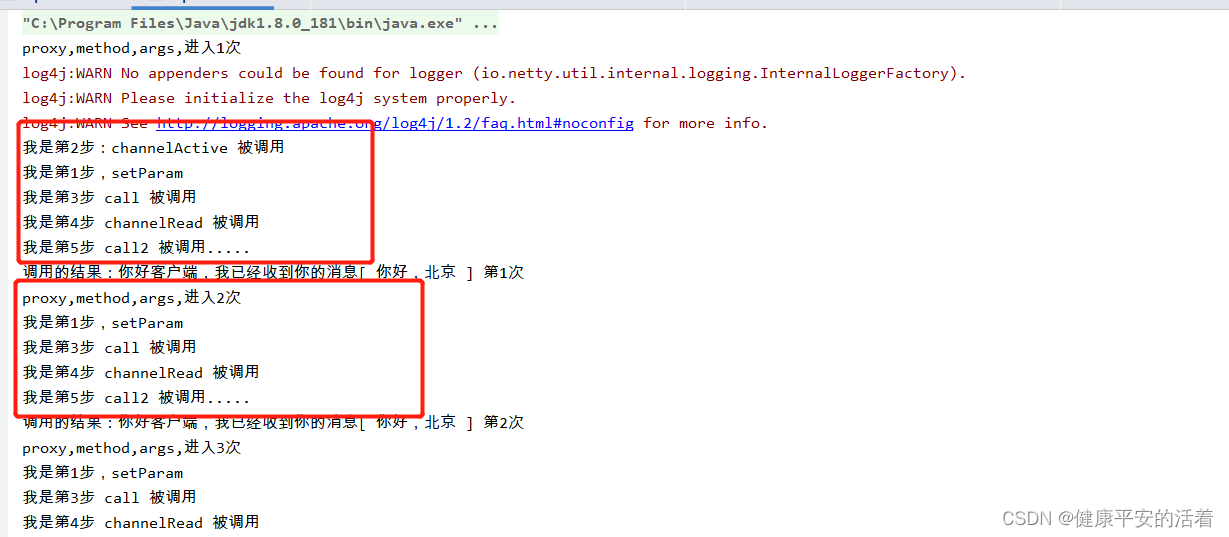一 RPC协议
1.1 RPC协议
RPC:remote procedure call : 远程过程调用,是一个计算机通信协议。允许一台机器程序调用另外一台机器的应用。用户无需关心细节,调用本地方法一样的调用远程方法。
常见的RPC框架:阿里的dubbo,google的gRPC, 还有apache的thrift,spring的spring cloud
二 通过基于netty实现RPC通信
2.1 需求说明
消费者和提供者约定接口和协议,消费者远程调用提供者的服务,提供者返回一个字符串,消费者打印提供者返回的数据。
1.创建一个接口,定义抽象方法,用于消费者和提供者之间的约定。
2.创建一个提供者,该类需要监听消费者的请求,并按照约定返回数据。
3.创建一个消费者,该类需要透明的调用自己不存在的方法,内部需要使用netty请求提供者返回数据。

2.2 代码实现
代码说明:
1.客户端中handler的里方法执行顺序

2. public synchronized Object call() 和
public synchronized void channelRead(ChannelHandlerContext ctx,Object msg)
两个方法是互斥的方法:具有先后执行顺序,加了同步锁,call方法执行wait内容之前的内容的,将消息发送给服务端,服务端将信息发给客户端的channelRead()方法,执行里面notify方法将call方法后面的wait内容唤醒,继续将call方法内容执行完。
3.其中客户端使用了动态代理,目前知识技能有限,不是完全理解,待学习!!!!
2.2.1 公共接口
1.接口
public interface NiHaoService {
//这个接口,提供者和消费者公用一个接口
public String hello(String mess);
}
2.实现层
package com.ljf.netty.netty.rpc;
/**
* @ClassName: NiHaoServiceImpl
* @Description: TODO
* @Author: liujianfu
* @Date: 2022/07/16 10:28:06
* @Version: V1.0
**/
public class NiHaoServiceImpl implements NiHaoService {
private static int count=0;
//当有消费者调用该方法时,就返回一个结果
@Override
public String hello(String mess) {
System.out.println("收到客户端消息:"+mess);
//根据mess返回不同的结果
if(mess!=null){
return "你好客户端,我已经收到你的消息[ "+mess+" ] 第"+(++count)+"次";
}
else{
return "你好客户端,我已经收到你的消息";
}
}
}
2.2.2 客户端
1.处理类
package com.ljf.netty.netty.rpc;
import io.netty.channel.ChannelHandlerContext;
import io.netty.channel.ChannelInboundHandlerAdapter;
import java.util.concurrent.Callable;
/**
* @ClassName: NettyClientHandler
* @Description: TODO
* @Author: liujianfu
* @Date: 2022/07/16 20:28:51
* @Version: V1.0
**/
public class NettyClientHandler extends ChannelInboundHandlerAdapter implements Callable {
private ChannelHandlerContext context;//上下文
private String result;//返回结果
private String para;//客户端调用方法时,传入的参数
//与服务器的连接创建后,就会被调用,这个方法的第一个被调用 调用顺序 第2步
public void channelActive(ChannelHandlerContext ctx)throws Exception{
System.out.println("我是第2步:channelActive 被调用");
context=ctx;//因为我们在其他方法会使用到ctx
}
//收到服务器的数据后,调用方法; 调用顺序,第4步
public synchronized void channelRead(ChannelHandlerContext ctx,Object msg) throws Exception{
System.out.println("我是第4步 channelRead 被调用");
result=msg.toString();
notify();//唤醒等待的线程。
}
//被代理对象调用,发送数据给服务器, wait,等待被唤醒,返回结果, 调用第3步 或者第5步
public synchronized Object call() throws Exception {
System.out.println("我是第3步 call 被调用");
context.writeAndFlush(para);
//进行wait
wait();//等待channelRead方法获取到服务器的结果后,唤醒
System.out.println("我是第5步 call2 被调用.....");
return result;//服务方返回结果
}
//调用顺序 第1步
void setPara(String param){
System.out.println("我是第1步,setParam ");
this.para=param;
}
// 异常处理
public void exceptionCaught(ChannelHandlerContext ctx,Throwable cause) throws Exception{
ctx.close();
}
}
2.客户类
package com.ljf.netty.netty.rpc;
import io.netty.bootstrap.Bootstrap;
import io.netty.channel.ChannelInitializer;
import io.netty.channel.ChannelOption;
import io.netty.channel.ChannelPipeline;
import io.netty.channel.nio.NioEventLoop;
import io.netty.channel.nio.NioEventLoopGroup;
import io.netty.channel.socket.SocketChannel;
import io.netty.channel.socket.nio.NioSocketChannel;
import io.netty.handler.codec.string.StringDecoder;
import io.netty.handler.codec.string.StringEncoder;
import java.lang.reflect.Proxy;
import java.util.concurrent.ExecutorService;
import java.util.concurrent.Executors;
/**
* @ClassName: NettyClient
* @Description: TODO
* @Author: liujianfu
* @Date: 2022/07/16 15:18:51
* @Version: V1.0
**/
public class NettyClient {
//创建线程池
private static ExecutorService executorService= Executors.newFixedThreadPool(Runtime.getRuntime().availableProcessors());
private static NettyClientHandler client;
private int count=0;
//编写方法使用代理模式,获取一个代理对象
public Object getBean(final Class<?> serviceClass,final String providerName){
return Proxy.newProxyInstance(Thread.currentThread().getContextClassLoader(),new Class<?>[]{serviceClass},(proxy,method,args)->{
System.out.println("proxy,method,args,进入"+(++count)+"次");
if(client==null) {
initClient();
}
client.setPara(providerName+args[0]);
return executorService.submit(client).get();
});
}
//初始化客户端
public static void initClient(){
client=new NettyClientHandler();
//创建EventLoopGroup
NioEventLoopGroup group=new NioEventLoopGroup();
Bootstrap bootstrap=new Bootstrap();
bootstrap.group(group);
bootstrap.channel(NioSocketChannel.class).option(ChannelOption.TCP_NODELAY,true)
.handler(new ChannelInitializer<SocketChannel>() {
public void initChannel(SocketChannel ch){
ChannelPipeline pipeline=ch.pipeline();
pipeline.addLast(new StringDecoder());
pipeline.addLast(new StringEncoder());
pipeline.addLast(client);
}
});
try{
bootstrap.connect("127.0.0.1",7000).sync();
}
catch (Exception e){
e.printStackTrace();
}
}
}
3.启动类
package com.ljf.netty.netty.rpc;
/**
* @ClassName: RpcClient
* @Description: TODO
* @Author: liujianfu
* @Date: 2022/07/16 20:20:15
* @Version: V1.0
**/
public class RpcClient {
//这里定义协议头
public static final String proviName="oc-md#";
public static void main(String args[])throws Exception{
//创建一个消费者
NettyClient customer=new NettyClient();
//创建代理对象
NiHaoService service=(NiHaoService) customer.getBean(NiHaoService.class,proviName);
for(;;){
Thread.sleep(2*1000);
//通过dialing对象调用服务提供者的方法
String res=service.hello("你好,北京");
System.out.println("调用的结果:"+res);
}
}
}
2.2.3 服务端
1.处理类
package com.ljf.netty.netty.rpc;
import io.netty.channel.ChannelHandlerContext;
import io.netty.channel.ChannelInboundHandler;
import io.netty.channel.ChannelInboundHandlerAdapter;
/**
* @ClassName: NettyServerHandler
* @Description: TODO
* @Author: liujianfu
* @Date: 2022/07/16 12:53:01
* @Version: V1.0
**/
public class NettyServerHandler extends ChannelInboundHandlerAdapter {
//
public void channelRead(ChannelHandlerContext ctx,Object msg)throws Exception{
//获取客户端发送的消息,并调用服务
System.out.println("msg="+msg);
//客户端在调用服务器的api时,我们需要定义一个协议
//比如我们要求,每次发送消息都必须是以某个字符串开头,“boc-md#123”
if(msg.toString().startsWith(RpcClient.proviName)){
String result=new NiHaoServiceImpl().hello(msg.toString().substring(msg.toString().lastIndexOf("#")+1));
ctx.writeAndFlush(result);
}
}
public void exceptionCaught(ChannelHandlerContext ctx,Throwable cause) throws Exception{
ctx.close();
}
}
2. 服务端
package com.ljf.netty.netty.rpc;
import io.netty.bootstrap.ServerBootstrap;
import io.netty.channel.ChannelFuture;
import io.netty.channel.ChannelInitializer;
import io.netty.channel.ChannelPipeline;
import io.netty.channel.EventLoopGroup;
import io.netty.channel.nio.NioEventLoopGroup;
import io.netty.channel.socket.SocketChannel;
import io.netty.channel.socket.nio.NioServerSocketChannel;
import io.netty.handler.codec.string.StringDecoder;
import io.netty.handler.codec.string.StringEncoder;
/**
* @ClassName: NettyServer
* @Description: TODO
* @Author: liujianfu
* @Date: 2022/07/16 12:23:55
* @Version: V1.0
**/
public class NettyServer {
public static void startServer(String hostName,int port) {
EventLoopGroup bossGroup = new NioEventLoopGroup(1);
EventLoopGroup workerGroup = new NioEventLoopGroup();
try {
ServerBootstrap serverBootstrap = new ServerBootstrap();
serverBootstrap.group(bossGroup, workerGroup)
.channel(NioServerSocketChannel.class)
.childHandler(new ChannelInitializer<SocketChannel>() {
protected void initChannel(SocketChannel ch) throws Exception {
ChannelPipeline pipeline = ch.pipeline();
pipeline.addLast(new StringDecoder());
pipeline.addLast(new StringEncoder());
pipeline.addLast(new NettyServerHandler());//业务处理器
}
});
ChannelFuture channelFuture = serverBootstrap.bind(hostName, port).sync();
System.out.println(" 服务提供方开始提供服务....");
channelFuture.channel().closeFuture().sync();
}
catch(Exception e){
e.printStackTrace();
}
finally {
bossGroup.shutdownGracefully();
workerGroup.shutdownGracefully();
}
}
}
3.启动类
package com.ljf.netty.netty.rpc;
/**
* @ClassName: RpcServer
* @Description: TODO
* @Author: liujianfu
* @Date: 2022/07/16 12:23:05
* @Version: V1.0
**/
public class RpcServer {
public static void main(String[] args) {
NettyServer.startServer("127.0.0.1",7000);
}
}
2.2.4.调试
客户端信息

2.服务端信息






 本文详细介绍了如何使用Netty实现RPC通信,包括客户端和服务端的处理类、接口定义、动态代理等关键步骤。通过创建一个公共接口,消费者和提供者约定交互方式,然后利用Netty进行网络通信,实现远程过程调用。文中还展示了客户端的线程同步机制,确保调用的正确执行顺序。
本文详细介绍了如何使用Netty实现RPC通信,包括客户端和服务端的处理类、接口定义、动态代理等关键步骤。通过创建一个公共接口,消费者和提供者约定交互方式,然后利用Netty进行网络通信,实现远程过程调用。文中还展示了客户端的线程同步机制,确保调用的正确执行顺序。
















 1750
1750

 被折叠的 条评论
为什么被折叠?
被折叠的 条评论
为什么被折叠?








